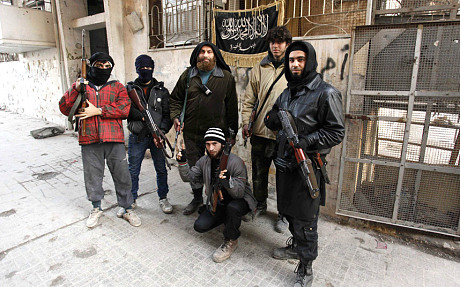PHOTO: Jabhat al-Nusra fighters in Aleppo
On Sunday the rebel brigade Harakat Hazm dissolved itself after three months of fighting with the Islamist faction Jabhat al-Nusra in northwest Syria,
The fighters of Harakat Hazm, which has received US-made heavy weapons and was promoted in US media in early 2014 as the face of the “moderate” rebellion, have reformed within the rebel bloc Levant Front.
Unsurprisingly, mainstream outlets such as Reuters have simplified — and arguably distorted — the developments to an ideological victory of “Al Qa’eda” Jabhat al-Nusra over “Western-backed” opposition. The reality is a far more complex display of the tensions within the rebel forces, one of rivalry between two local forces amid claims of corruption, kidnapping, and murder.
The trouble began in late November when Jabhat al-Nusra was fighting another group, the Syrian Revolutionary Front, in northwest Syria. The SRF claimed that Jabhat al-Nusra was trying to take over the rebellion, quashing any faction that challenged it. Jabhat al-Nusra said the SRF’s leader, Jamal Maarouf, and some of its fighters were guilty of war-profiteering, stealing weapons and supplies.
Harakat Hazm intervened in the conflict, trying to prevent Jabhat al-Nusra from passing its checkpoints to fight the SRF. The attempt led to clashes for several days.
Other rebel groups, including the umbrella organization of the Levant Front, intervened and sought reconciliation. However, tension continued, and in recent weeks Jabhat al-Nusra and Harakat Hazm swapped serious accusations. Each accused the other of kidnapping and even assassinating fighters and of blocking supply routes.
Last week Harakat Hazm allegedly killed several Jabhat al-Nusra fighters, including a commander, whom it had detained. Jabhat al-Nusra responded with an ultimatum: hand over the murderers for “trial” or you will be attacked.
The Levant Front sought an agreement between the two groups for an independent sharia court to hear the charges. Residents of villages in Aleppo Province called for a halt to the fighting. The efforts were to no avail: over the weekend, Jabhat al-Nusra defeated Harakat Hazm in a skirmish on the “Regiment 46” base near the town of al-Atareb. Some Islamist fighters are still moving near al-Atareb, looking for Harakat Hazm men who fled the base.
So was all this an attempt by “Al Qa’eda” to impose its ideological will across the Syrian rebellion?
Sources on the ground offer a portrayal beyond that simple conclusion. They summarize:
Jabhat al-Nusra rightly cracks down on criminals, and that gets reported as in-fighting. On the other hand, particularly thuggish Jabhat al-Nusra fighters do exactly the same thing [criminal behavior] about which they are accusing others.
We have a fight of some Jabhat al-Nusra extremists — most of them not locals — against some criminals that escalated in Aleppo Province because the root of the evil managed to get their organizations involved.
We are talking kinda personal conflicts in the context of factions — weird and dangerous.
The sources say the conflict was exacerbated by Jabhat al-Nusra’s enforcement of its rule in territory that it controls in Idlib Province, next to Aleppo Province. The Islamists have been accused by local people of oppressive laws, detaining and beating civilians.
The Idlibis consider their province mostly liberated. They do not want just another oppressor. Opposition against Jabhat al-Nusra thugs trying to show their might increases by the day. It is only because many respect Jabhat al-Nusra’s sacrifices to the liberation that they don’t all take up arms — but JAN extremists escalate the tensions.
One source asserts, “The Idlib in-fighting, which began with conflicts between individuals and small bands within the factions, made it more complicated for the upper leadership to keep calm.”
The sources worry about the effect of the in-fighting on the rebel fight against the Assad regime in the northwest. The opposition has won notable victories in recent weeks, including the devastating repulse of a Syrian offensive backed by Hezbollah and Iran; however, the Jabhat al-Nusra battle with Harakat Hazm “is not good for the war near Idlib city, Aleppo, and other places.”
Others are concerned that the Assad regime may be exploiting and even fomenting the situation. One activist summarizes, “It is likely that the mukhabarat [security services] are behind a few of the individuals who did everything imaginable to escalate the fight to this point.”
Another rebel concludes with a look to the future, which intersects the simplistic headlines but goes beyond them:
Remember, some Harakat Hazm members were smugglers and highway robbers. Remember some Jabhat al-Nusra members were Al Qa’eda fans.
Those ain’t compatible. At least not on the long run.

